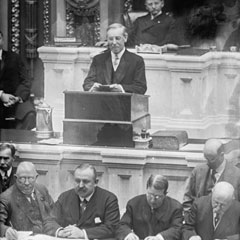A Jersey-Rooted State Of The Union (1913)

While President Trump delivered his first State of the Union address tonight, it was NJ’s own President Woodrow Wilson who re-established the practice of delivering the speech in person to Congress in 1913, the first to do so since the early 1800s. Every president has followed suit.
In his 1913 address, Wilson spoke of a United States ‘at peace with the world’ with ‘but one cloud upon our horizon’: Mexican General Huerta, of whom Wilson said ‘there can be no certain prospect of peace in America’ until Huerta surrendered his ‘usurped authority’.
He urged Congress to pass banking and currency reform legislation and urged a special provision that would create a rural credit system for farmers, saying it would put them ‘upon an equal footing with other business men and masters of enterprise, as it should.’
He spoke of the business communities in urban centers, saying ‘the immediate service we owe the business communities of the country is to prevent private monopoly more effectually than it has yet been prevented’.
He turned to the presidential selection process, progressively advocating for primaries, and for party conventions ‘only for the purpose of declaring and accepting the verdict of the primaries and formulating the platforms of the parties’.
He spoke of the American territories, naming Puerto Rico among them, and as America of their trustees: ‘ours, indeed, but not ours to do what we please with.’ He talked of responsibility to them: ‘we must administer them for the people who live in them and with the same sense of responsibility to them as toward our own people in our domestic affairs.’
He touched on infrastructure and urged the construction of railroads, and said ‘we must use the resources of the country, not lock them up’ and that ‘resources in question must be used, but not destroyed or wasted; used, but not monopolized upon any narrow idea of individual rights as against the abiding interests of communities.’
He addressed energy and coaling, saying the government should aim to improve the ‘conditions of mine labor and making the mines more economically productive as well as more safe’ and ‘the conservation of human life and energy lies even nearer to our interests than the preservation from waste of our material resources.’
He advocated for rail workers’ rights, saying the government owed them a fair employer’s liability act. ‘Social justice comes first,’ he said. ‘Law is the machinery for its realization and is vital only as it expresses and embodies it.
Read Wilson’s SOTU address here.










Leave a Reply